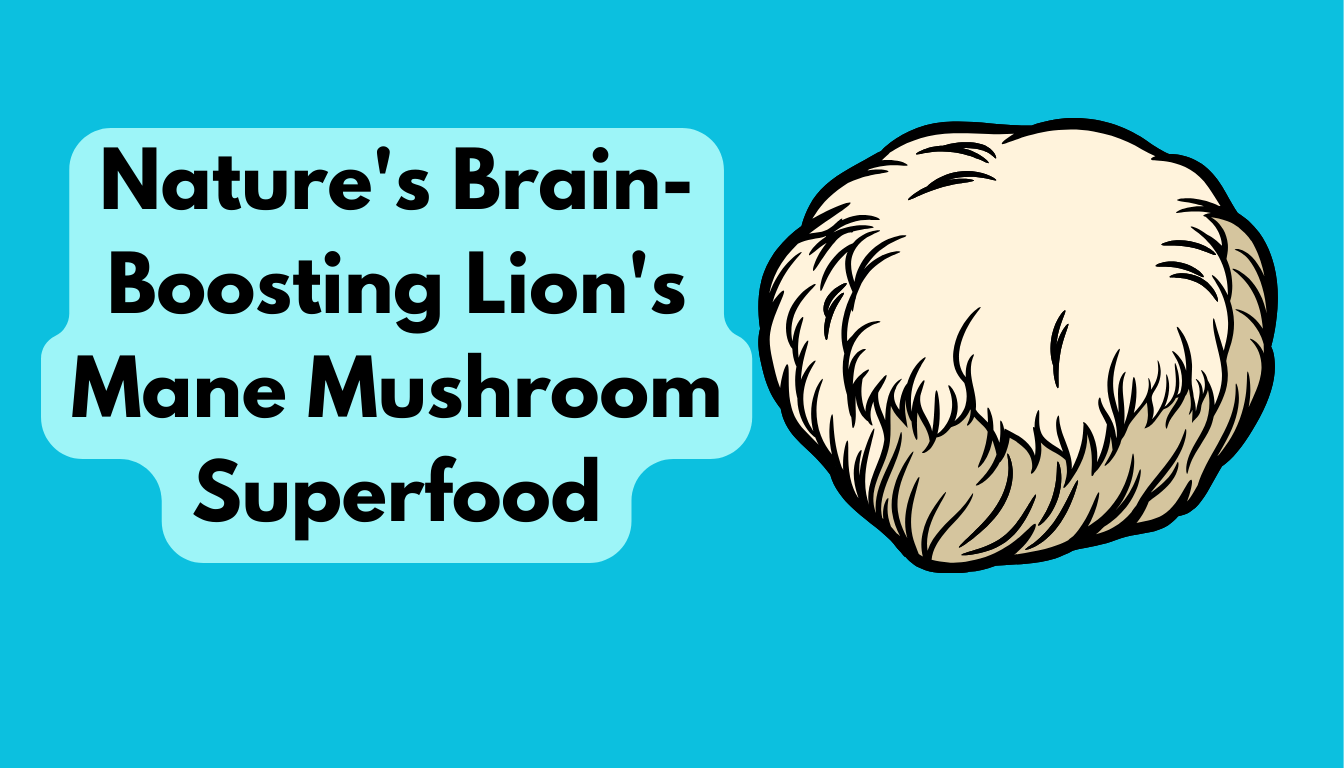Lion’s Mane (Hericium erinaceus) is a distinctive and highly revered mushroom known for
its unique shaggy appearance and impressive health benefits. With a history rooted in
Traditional Chinese Medicine (TCM), Lion’s Mane has been used for centuries to support
cognitive function, improve digestion, and bolster immunity. Today, it is celebrated for its
nootropic (cognitive-enhancing) effects and is extensively studied for its potential in
combating neurodegenerative diseases, boosting mood, and improving physical health. This
article explores the health benefits of Lion’s Mane in depth, backed by scientific research and
traditional insights.


1. Cognitive Health and Neuroprotection
Neurogenesis and Brain Health
Lion’s Mane is renowned for its neuroprotective properties, which stem from its ability to
stimulate Nerve Growth Factor (NGF) production. NGF is essential for the maintenance,
survival, and regeneration of neurons, the primary cells responsible for transmitting signals in
the brain and nervous system. Lion’s Mane contains bioactive compounds like hericenones
and erinacines, which have been shown to cross the blood-brain barrier and support NGF
production, thus promoting brain plasticity and neuron repair.
Memory and Focus
Studies have shown that Lion’s Mane can enhance memory, concentration, and cognitive
function. For example, a 2009 study involving elderly Japanese participants with mild
cognitive impairment found that those who consumed Lion’s Mane extract for 16 weeks
showed significantly better scores on cognitive function tests compared to those who received
a placebo. These benefits appeared to decline after stopping supplementation, suggesting that
Lion’s Mane has an acute effect on mental clarity and may need ongoing consumption for
long-term cognitive support.
Potential Role in Alzheimer’s and Parkinson’s Disease
Research indicates that Lion’s Mane may be valuable in treating or preventing
neurodegenerative conditions like Alzheimer’s and Parkinson’s disease. This mushroom’s
ability to stimulate NGF production, reduce oxidative stress, and decrease beta-amyloid
plaque buildup in the brain suggests it could help mitigate the progression of Alzheimer’s.
Furthermore, the anti-inflammatory properties of Lion’s Mane may protect brain cells from
damage, which could slow the progression of Parkinson’s disease.


2. Immune System Support
Lion’s Mane possesses potent immune-boosting properties due to its high content of
polysaccharides, especially beta-glucans. Beta-glucans are known to enhance immune
response by activating macrophages, dendritic cells, and natural killer cells, which play a
vital role in the body’s defense mechanisms. Some research also indicates that Lion’s Mane
can help modulate the immune system, making it an adaptogenic agent that helps balance
immune responses based on the body’s needs.
Anti-Inflammatory and Antioxidant Properties
Chronic inflammation is associated with numerous health issues, from arthritis to heart
disease. Lion’s Mane has been found to reduce inflammation and oxidative stress through its
powerful antioxidant compounds. The mushroom’s ability to lower inflammation markers
may support general immune health, protect organs, and reduce the risk of inflammatory
diseases. Additionally, its high antioxidant content helps neutralize free radicals, potentially
slowing the aging process and reducing the risk of chronic illnesses.


3. Gut Health and Digestive Support
The gut-brain axis is a significant area of study in modern medicine, and Lion’s Mane is
believed to positively influence both the gut and the brain. The mushroom’s polysaccharides
and anti-inflammatory compounds help soothe the digestive tract, reduce inflammation, and
promote healthy gut bacteria. A balanced gut microbiome is essential for effective digestion,
nutrient absorption, and immune function.
In animal studies, Lion’s Mane has been shown to reduce the symptoms of stomach ulcers,
likely due to its anti-inflammatory and antioxidant properties. The mushroom may also
support gut healing by strengthening the stomach lining and promoting tissue regeneration,
which can be beneficial for individuals with chronic gut issues such as inflammatory bowel
disease (IBD).
4. Heart Health and Metabolic Benefits
Lion’s Mane may benefit cardiovascular health by reducing levels of LDL cholesterol,
triglycerides, and other heart disease risk factors. Animal studies have shown that the
mushroom’s compounds may prevent oxidation of cholesterol in the bloodstream, reducing
the risk of atherosclerosis, which can lead to heart attack or stroke. Additionally, Lion’s
Mane appears to improve blood sugar regulation and insulin sensitivity, potentially
supporting metabolic health and reducing the risk of type 2 diabetes.
5. Mood Regulation and Mental Health
The mental health benefits of Lion’s Mane are increasingly recognized, particularly its
potential for reducing symptoms of anxiety and depression. Some studies suggest that Lion’s
Mane may help alleviate anxiety and depression by reducing inflammation in the brain and
improving the functioning of the hippocampus, the region of the brain involved in memory
and emotional regulation.
A 2010 study involving post-menopausal women found that those who took Lion’s Mane
extract for four weeks reported reduced symptoms of anxiety and depression compared to the
control group. These benefits are likely due to the mushroom’s ability to enhance NGF
production and stimulate neurogenesis, which may improve overall mood and cognitive
resilience.
6. Anti-Cancer Potential
Emerging research suggests that Lion’s Mane may have anti-cancer properties, particularly
against stomach, liver, colon, and blood cancers. The polysaccharides in Lion’s Mane have
been shown to induce apoptosis (programmed cell death) in cancer cells and inhibit tumor
growth in animal models. Additionally, some studies indicate that the mushroom may reduce
the proliferation of cancer cells by boosting the body’s natural immune response to fight
against abnormal cells.
While more research is needed to fully understand Lion’s Mane’s role in cancer treatment, its
anti-tumor and immune-modulating effects hold promising potential as an adjunct therapy in
oncology.
7. Energy and Physical Endurance
Lion’s Mane is also thought to boost physical stamina and energy levels, potentially due to its
effects on cellular mitochondria, the energy-producing units of cells. Enhanced mitochondrial
function can lead to better physical endurance, making Lion’s Mane a popular choice among
athletes and individuals seeking natural energy enhancement.
How to Incorporate Lion’s Mane into Your Routine
Lion’s Mane is available in various forms, including capsules, powders, and tinctures.
Choosing a high-quality, organic supplement can help ensure that you’re receiving the full
spectrum of its bioactive compounds. Here are a few ways to incorporate Lion’s Mane into
your routine:
Capsules or Tablets: Convenient for daily use, capsules are a popular choice for
those seeking a precise dose of Lion’s Mane.
Powder: Often added to smoothies, coffee, or tea, Lion’s Mane powder is versatile
and allows you to control the dose.
Tinctures: Liquid extracts offer a potent, concentrated form of Lion’s Mane and can
be added to drinks or taken directly.


Conclusion
Lion’s Mane mushroom offers a broad array of health benefits, from enhancing cognitive
function to supporting immune health and digestion. As research continues to uncover its
potential, Lion’s Mane is becoming a valuable supplement in natural wellness routines. By
supporting brain health, reducing inflammation, and balancing the immune response, Lion’s
Mane can be an effective addition to a holistic approach to health and well-being. However,
as with any supplement, it’s essential to consult a healthcare provider before adding Lion’s
Mane to your regimen, particularly if you have underlying health conditions or are taking
medications.
Check out our Lion’s Manes at www.earthbiotics.co.uk or click the link below:
#LionsMane #LionsManeMushroom #FunctionalMushrooms #MushroomMedicine #MushroomTherapy #BrainHealth #CognitiveHealth #MentalClarity #MemorySupport #Nootropics #HerbalMedicine #NaturalSupplements #HolisticHealth #Superfoods #FungiPower #Adaptogens #MushroomScience #Neurogenesis #BrainBoost #LionManeBenefits



